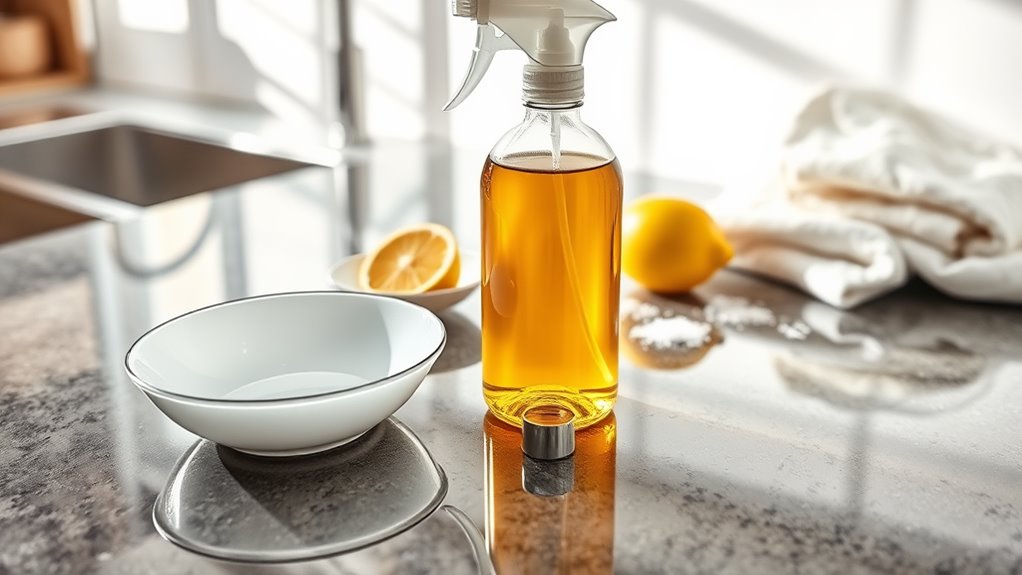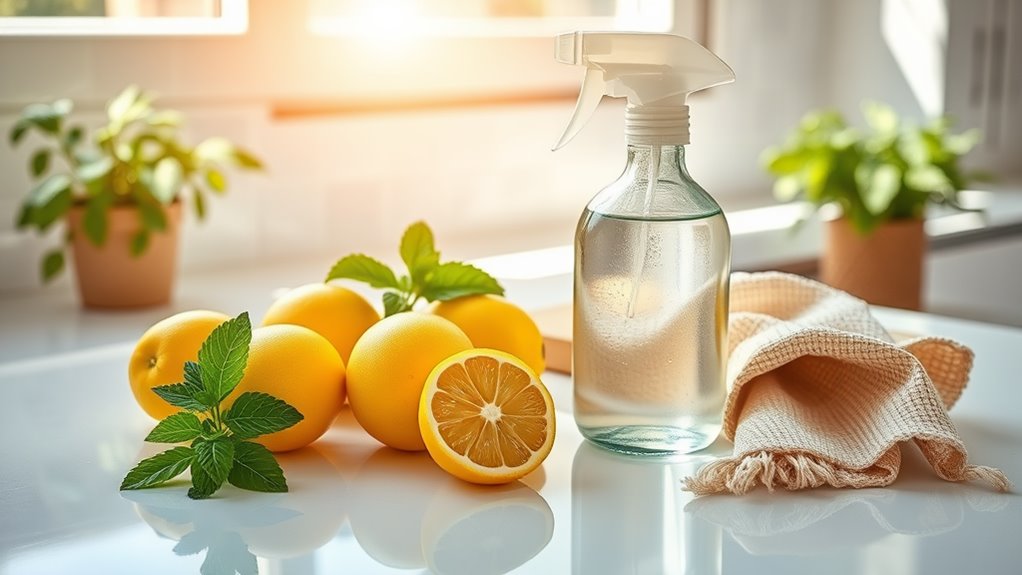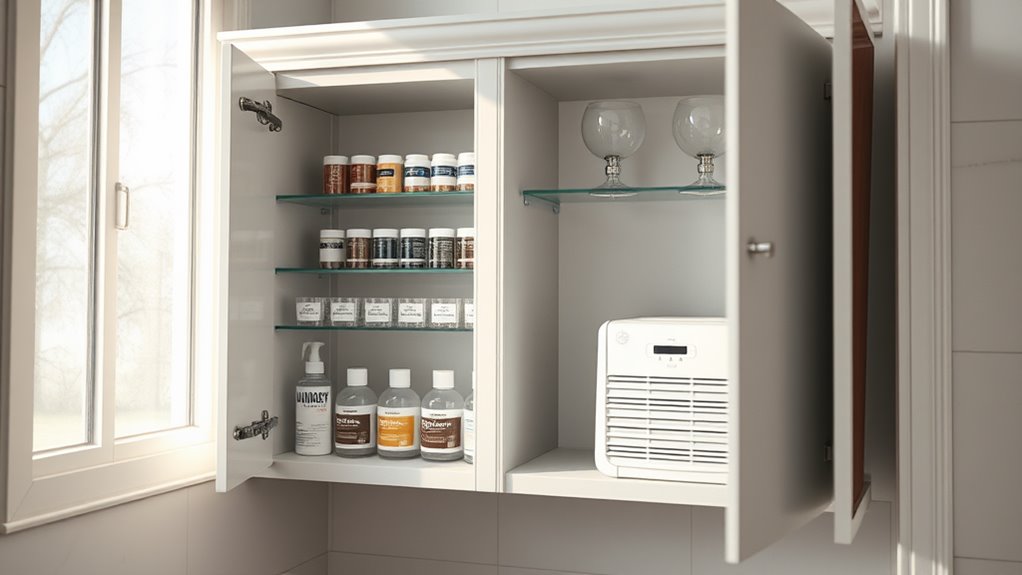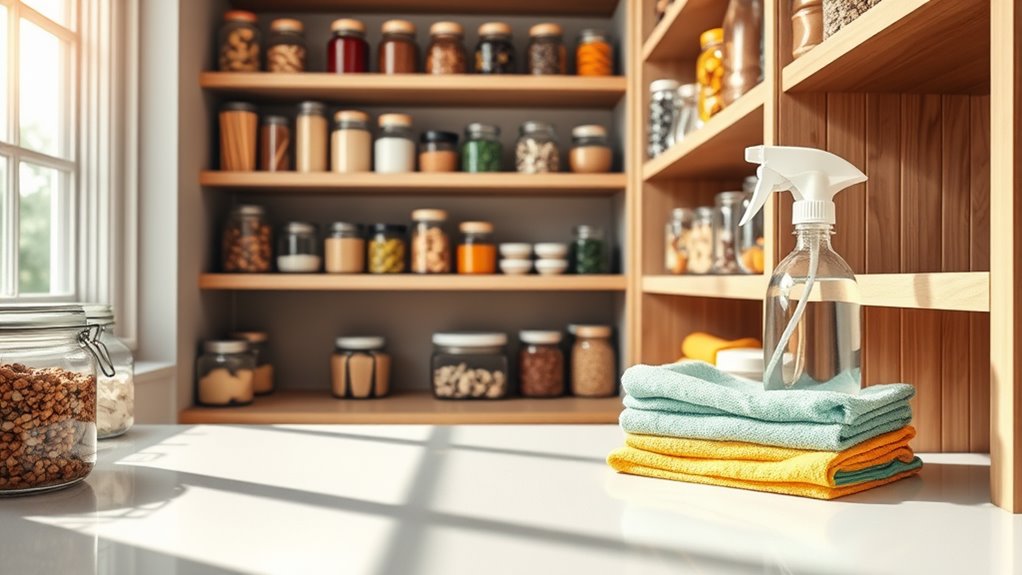This DIY Vinegar Spray Works Wonders on Grimy Surfaces
This DIY vinegar spray works wonders on grimy surfaces because it’s natural and effective. Just mix equal parts distilled white vinegar and water in a spray bottle, and you’re all set. Apply it to countertops, glass, or stainless steel for a deep clean that cuts through grease and grime. Let it sit for a few minutes for tough stains, then wipe with a microfiber cloth. There’s more to learn about customizing your spray and storage tips for ideal use.
Key Takeaways
- DIY vinegar spray combines equal parts vinegar and water, making it an effective and economical cleaner for various surfaces.
- Its natural antibacterial properties help eliminate germs and odors, ensuring a hygienic environment.
- The spray effectively tackles common grime types, including grease, soap scum, and mineral deposits on surfaces.
- For stubborn grime, increase the vinegar ratio to enhance its cleaning power while still being safe for most surfaces.
- Customizing with essential oils not only boosts cleaning effectiveness but also leaves a pleasant scent after use.
Understanding the Power of Vinegar as a Cleaner
When you think about effective cleaning solutions, vinegar often stands out due to its natural antibacterial properties and ability to cut through grease.
This powerhouse of a cleaner is versatile and economical, making it ideal for those wanting to master their cleaning game. A vinegar spray can tackle a variety of surfaces, from kitchen counters to bathroom tiles, without the harsh chemicals found in commercial cleaners. Additionally, vinegar is effective in removing hard water stains, which can be a persistent issue in many households. Vinegar can also be combined with essential oils to enhance its scent and disinfecting properties. Using a vinegar spray can help to maintain the shine on stainless steel appliances, ensuring they look their best. It is also a great alternative to chemical cleaners, providing a safer option for families and pets.
Its acidity breaks down tough grime and eliminates odors, leaving your spaces fresh. Additionally, using a vinegar spray regularly helps maintain cleanliness, preventing buildup and ensuring a healthy environment. Combining vinegar and baking soda can enhance its cleaning effectiveness for tougher stains.
Ingredients Needed for Your DIY Vinegar Spray
Creating your own DIY vinegar spray is simple and requires just a few ingredients that you probably already have at home.
First, grab a cup of distilled white vinegar, known for its strong cleaning properties. Next, you’ll need a cup of water to dilute the vinegar and make it safe for various surfaces. Vinegar is an effective natural cleaner because it can help eliminate odors and disinfect surfaces. Additionally, vinegar’s acidity level contributes to its ability to break down grime and dirt effectively, making it a popular choice among those seeking eco-friendly cleaning solutions. This powerful cleaner not only helps reduce chemical exposure but also provides a safe alternative for households with children and pets.
Optional, but highly effective, you can add a tablespoon of dish soap for extra grease-fighting power. If you prefer a pleasant scent, consider incorporating a few drops of essential oils, like tea tree or lemon.
Additionally, using the right countertop surfaces is crucial to ensure that your homemade cleaner is effective and safe. Finally, make sure you have a clean spray bottle to mix and store your solution. With these ingredients, you’re on your way to mastering a powerful cleaning tool!
Step-by-Step Instructions to Make the Spray
Making your DIY vinegar spray is a straightforward process that only takes a few minutes. Follow these steps for best results:
| Step | Action |
|---|---|
| 1 | Gather your ingredients. |
| 2 | In a clean spray bottle, combine equal parts vinegar and water. |
| 3 | Add optional essential oils for fragrance, if desired. |
| 4 | Secure the lid and shake gently to mix. |
Now you’ve got your cleaning spray ready to tackle grime! Remember that vinegar is a natural disinfectant that can effectively kill germs while being safe for households with children and pets. Additionally, using essential oils can enhance the cleaning power and provide a pleasant aroma. For optimal cleanliness, remember to apply proper disinfecting techniques when using your spray. After each shower, using this spray can help prevent mildew and keep your bathroom smelling fresh. If you want even better results, consider incorporating natural ingredients known for their cleaning properties. Store it in a cool, dark place to maintain its potency. Remember to label your bottle for future use. With these simple steps, you’ll master the art of creating a powerful, eco-friendly cleaning solution. Enjoy the satisfaction of a cleaner home!
Best Surfaces to Clean With Vinegar Spray
After preparing your DIY vinegar spray, you might be wondering where to put it to good use.
This versatile cleaner excels on surfaces like countertops, glass, and stainless steel. For kitchen surfaces, it cuts through grime and disinfects effectively.
In bathrooms, it tackles soap scum and hard water stains with ease. Use it on mirrors for a streak-free shine that enhances visibility.
Vinegar spray is also great for cleaning appliance exteriors and removing odors from fabrics.
Just avoid using it on natural stone surfaces like granite or marble, as the acidity can harm them.
Tips for Using Vinegar Spray Effectively
To get the most out of your vinegar spray, it’s essential to understand the best dilution ratios for different cleaning tasks.
Knowing which surfaces are compatible with vinegar will help you avoid damage, while effective application techniques can save you time and effort.
Let’s explore these tips to guarantee you clean efficiently and safely.
Best Vinegar Dilution Ratio
Finding the right vinegar dilution ratio is vital for maximizing the effectiveness of your cleaning spray. A common and effective ratio is one part vinegar to one part water, which balances cleaning power without overwhelming surfaces.
For tougher grime, you might increase the vinegar concentration to a 2:1 ratio. However, for delicate tasks, like cleaning windows, a more diluted mix—one part vinegar to three parts water—can help prevent streaking.
Always test your solution on a small, inconspicuous area first to confirm it won’t damage the surface.
Surface Compatibility Tips
While vinegar is a powerful cleaning agent, it’s crucial to know which surfaces it’s safe to use on.
Avoid using vinegar on natural stone surfaces like granite or marble, as it can etch and damage them. Similarly, steer clear of electronic screens and unsealed wood, which can absorb the liquid and warp.
On the other hand, vinegar works wonders on glass, stainless steel, and ceramic surfaces. Test a small area first to verify compatibility, especially on painted surfaces.
When cleaning, always dilute vinegar with water to lessen its acidity, and never mix it with bleach, as this creates toxic fumes.
Application Techniques for Efficiency
Although vinegar spray is an effective cleaning solution, using the right application techniques can enhance its cleaning power.
First, always spray directly onto the surface, allowing the vinegar to penetrate grime. Let it sit for a few minutes; this dwell time maximizes its effectiveness.
For tougher stains, use a microfiber cloth to gently scrub the area, leveraging its texture to lift dirt.
When working on larger surfaces, apply vinegar in sections to guarantee thorough coverage.
Don’t forget to rinse with water afterward, especially on food-contact surfaces, to remove any residual vinegar smell.
Finally, experiment with ratios; sometimes mixing vinegar with water or baking soda can yield even better results.
Master these techniques, and you’ll elevate your cleaning game!
Safety Precautions When Using Vinegar
When you’re using vinegar for cleaning, make sure you’ve got proper ventilation to avoid any strong odors.
It’s also smart to protect your skin by wearing gloves, as vinegar can be harsh on sensitive skin.
Keeping these safety precautions in mind will help you clean effectively and safely.
Proper Ventilation Required
To guarantee your safety while using vinegar for cleaning, it’s vital to maintain proper ventilation in the area.
Vinegar’s strong odor can be overwhelming, and good airflow helps dissipate the scent while reducing any potential irritation to your respiratory system. Open windows and doors to create a cross-breeze, or use a fan to enhance circulation.
If you’re cleaning a particularly enclosed space, consider wearing a mask to further protect yourself from any concentrated vinegar fumes.
Proper ventilation not only makes the cleaning process more pleasant but also guarantees you can work efficiently without discomfort.
Skin Protection Needed
While vinegar is a natural and effective cleaner, it can irritate your skin if you’re not careful. To protect yourself, always wear gloves when handling vinegar solutions. This simple step prevents direct contact and shields your skin from potential irritation.
If you’re sensitive, consider using a mask and goggles as an extra precaution, especially when spraying. Always test your vinegar solution on a small area of your skin first to gauge any adverse reactions.
If you do experience irritation, rinse your skin immediately with water. Remember, mastery comes from understanding not just how to clean but how to do so safely.
With these precautions, you can confidently harness the power of vinegar without compromising your skin’s health.
Customizing Your Spray With Essential Oils
Adding essential oils to your vinegar spray not only enhances its cleaning power but also fills your home with delightful scents.
By customizing your spray, you can create an effective cleaning solution that also uplifts your environment. Here are some essential oils to contemplate:
- Lavender: Calming and antibacterial, perfect for bedrooms.
- Tea Tree: Known for its antifungal properties, great for bathrooms.
- Lemon: A natural degreaser with a fresh, invigorating scent.
- Peppermint: Energizing and effective against pests.
To customize, simply add 10-20 drops of your chosen essential oil to your vinegar spray.
Shake well before each use, and experience the dual benefits of a cleaner space and a pleasant aroma that transforms your cleaning routine into a sensory delight.
Common Grime Types and How Vinegar Tackles Them
When it comes to household cleaning, vinegar is a powerhouse against various types of grime.
It excels at breaking down mineral deposits, such as limescale on faucets and showerheads. Just spray it on, let it sit, and wipe it away to reveal a sparkling surface.
Vinegar also tackles grease effectively; its acidic properties dissolve stubborn kitchen residues with ease.
For soap scum in bathrooms, a vinegar spray softens the buildup, making it simple to scrub away.
If you’re facing mildew, vinegar’s antifungal properties help eliminate those pesky spots.
Storing Your DIY Vinegar Spray Properly
How can you guarantee your DIY vinegar spray stays effective for longer? Proper storage is key. Follow these tips to maintain potency and performance:
-
Use a dark glass bottle****: Protects the solution from light, which can degrade its effectiveness.
-
Seal tightly: Confirm the bottle is airtight to prevent evaporation and maintain the vinegar’s cleaning power.
-
Store in a cool, dry place****: Avoid heat and humidity, which can alter the composition.
-
Label your spray: Include the date of creation to keep track of freshness and know when to make a new batch.
Benefits of Using Vinegar Over Commercial Cleaners
While many people reach for commercial cleaners, using vinegar offers a range of benefits that can enhance your cleaning routine.
First, vinegar is non-toxic and eco-friendly, making it a safer choice for your home and the environment. You won’t have to worry about harsh chemicals harming your family or pets.
Second, vinegar’s acidity effectively cuts through grime, grease, and mineral deposits, providing a powerful clean without the need for multiple products.
Additionally, it’s cost-effective—one bottle can replace several commercial cleaners, saving you money in the long run.
Finally, vinegar’s versatility means you can use it on various surfaces, from kitchen counters to bathroom tiles.
Embracing vinegar in your cleaning arsenal empowers you to achieve mastery over your space.
Frequently Asked Questions
Can I Use Vinegar Spray on Wood Surfaces?
You can use vinegar spray on wood surfaces, but dilute it first to avoid damage. Test it on a small area to verify it won’t strip the finish or cause discoloration. Always follow up with a damp cloth.
How Often Should I Use the Vinegar Spray?
You should use the vinegar spray every two weeks for regular maintenance. If surfaces get particularly grimy, feel free to increase frequency. Always test in an inconspicuous area to guarantee it doesn’t damage your wood.
Is Vinegar Spray Safe for Pets?
Yes, vinegar spray is generally safe for pets when used in moderation. Just make sure your pets aren’t directly exposed to it while cleaning, and always ventilate the area to minimize any potential discomfort for them.
Can I Mix Vinegar With Other Cleaners?
You shouldn’t mix vinegar with other cleaners, especially bleach. Combining them can create toxic gases. Stick to using vinegar alone for effective cleaning, and you’ll avoid any dangerous reactions while achieving great results.
What Should I Do if the Smell Is Too Strong?
If the smell’s too strong, ventilate the area by opening windows and doors. You can also dilute the vinegar with water or add essential oils to mask the scent while maintaining its cleaning effectiveness.



